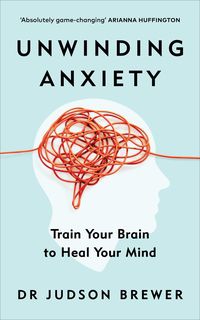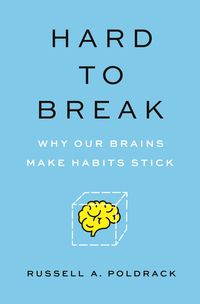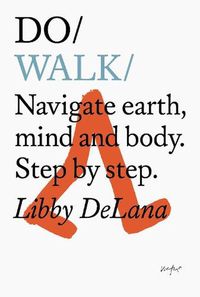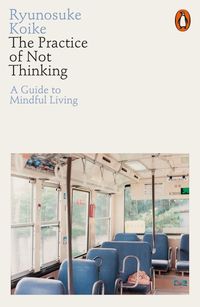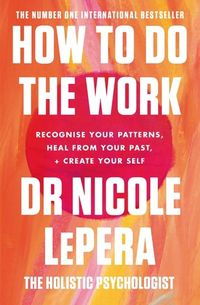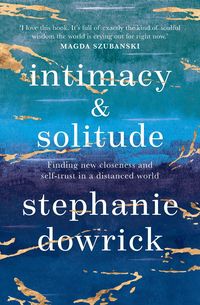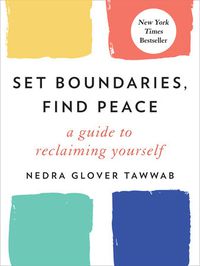Many of us have never faced so much uncertainty or carried so much anxiety, as we are now; we’ve also never faced such unique barriers to meaningfully reaching out to family, friends, and finding clinical support. Below are some suggestions for books that may assist individuals who are seeking, in addition to current care plans, supplementary support and strategies on how to cope with the challenges we are experiencing.
Unwinding Anxiety by Judson Brewer
We are living through one of the most anxious periods any of us can remember. In this timely book, Judson Brewer explains how to uproot anxiety at its source using accessible brain-based techniques.
We think of anxiety as everything from mild unease to full-blown panic. But it’s also what drives the addictive behaviours and bad habits we use to cope (e.g. stress eating, procrastination, doomscrolling). Plus, anxiety lives in a part of the brain that resists rational thought. So we get stuck in anxiety habit loops that we can’t think our way out of or use willpower to overcome. Dr. Brewer teaches us map our brains to discover our triggers, defuse them with the simple but powerful practice of curiosity, and to train our brains using mindfulness and other practices that his lab has proven can work.
Hard to Break by Russell A. Poldrack
Hard to Break offers a clear-eyed tour of what neuroscience tells us about habit change and debunks “easy fixes” that aren’t backed by science. It explains how dopamine is essential for building habits and how the battle between habits and intentional goal-directed behaviours reflects a competition between different brain systems. Along the way, we learn how cues trigger habits; why we should make rules, not decisions; how the stimuli of the modern world hijack the brain’s habit machinery and lead to drug abuse and other addictions. Hard to Break reveals how we might be able to make the changes we desire - and why we should have greater empathy with ourselves and others who struggle to do so.
You’re Not Listening by Kate Murphy
When was the last time you listened to someone, or someone really listened to you? This life-changing book will transform your conversations forever. At work, we’re taught to lead the conversation. On social media, we shape our personal narratives. At parties, we talk over one another. So do our politicians. We’re not listening. And no one is listening to us. Now more than ever, we need to listen to those around us.
Listening has the potential to transform our relationships and our working lives, improve our self-knowledge, and increase our creativity and happiness. While it may take some effort, it’s a skill that can be learnt and perfected. When all we crave is to understand and be understood, You’re Not Listening shows us how.
Do Walk by Libby DeLana
One morning in 2011, Libby DeLana stepped outside her New England home for a walk. She did the same thing the next day, and the next. It became a daily habit that has culminated in her walking over 25,000 miles – the equivalent of the earth’s circumference. In Do Walk, Libby shares the transformative nature of this simple yet powerful practice. She reveals how walking each day provides the time and space to reconnect with the world around us; process thoughts; improve our physical wellbeing; and unlock creativity. It is the ultimate navigational tool that helps us to see who we are beyond titles and labels, and where we want to go. With stunning photography, this inspiring and reflective guide is an invitation to step outside, and see where the path takes us.
The Practice of Not Thinking by Ryunosuke Koike
With remarkable clarity, Ryunosuke Koike shares the ways we can incorporate Zen practice into our daily life, resulting in a more productive, honest and present way of living. Koike’s theory tells us that our energy is predominantly being used to think negative and unnecessary thoughts, causing us to lose our ability to make decisions and our five senses to lose their strength. Ranging from complacency in your relationship, over-commitment at work to searching for approval from others, The Practice of Not Thinking will teach you how to re-train your brain and eliminate these challenging habits, leading to a quieter and more peaceful life.
How to Do the Work by Nicole LePera
In How to Do the Work, she offers both a manifesto for self-healing and an essential guide to creating a more vibrant, authentic, and joyful life. Drawing on the latest research from both scientific research and healing modalities, Dr LePera helps us recognise how adverse experiences live with us, keeping us stuck engaging in patterns of codependency, emotional immaturity, and trauma bonds. Unless addressed, these self-sabotaging behaviours can quickly become cyclical, leaving people feeling unhappy, unfulfilled, and unwell. Dr LePera offers readers the support and tools that will allow them to break free from destructive behaviours to reclaim and recreate their lives.
Intimacy and Solitude by Stephanie Dowrick
The quality of your personal relationships has never mattered more. It isn’t enough to have lots of friends on social media. Or to give ‘everything’ to work hoping that will validate your existence. When familiar certainties are dissolving, we need to give and receive closeness and understanding to feel fully alive. But how do we open to others in a world that can seem harsh, indifferent - and unpredictable in the extreme?
Intimacy and Solitude starts with the most fundamental relationship of all: how you understand and care for your own self - knowing this will inevitably be reflected in your most essential relationships.
Set Boundaries, Find Peace by Nedra Glover Tawwab
Healthy boundaries. We all know we should have them in order to achieve work/life balance, cope with toxic people, and enjoy rewarding relationships with partners, friends, and family. But what do healthy boundaries really mean - and how can we successfully express our needs, say no, and be assertive without offending others?
In a relatable and inclusive tone, Set Boundaries, Find Peace presents simple-yet-powerful ways to establish healthy boundaries in all aspects of life. Rooted in the latest research and best practices used in cognitive behavioral therapy (CBT), these techniques help us identify and express our needs clearly and without apology.


